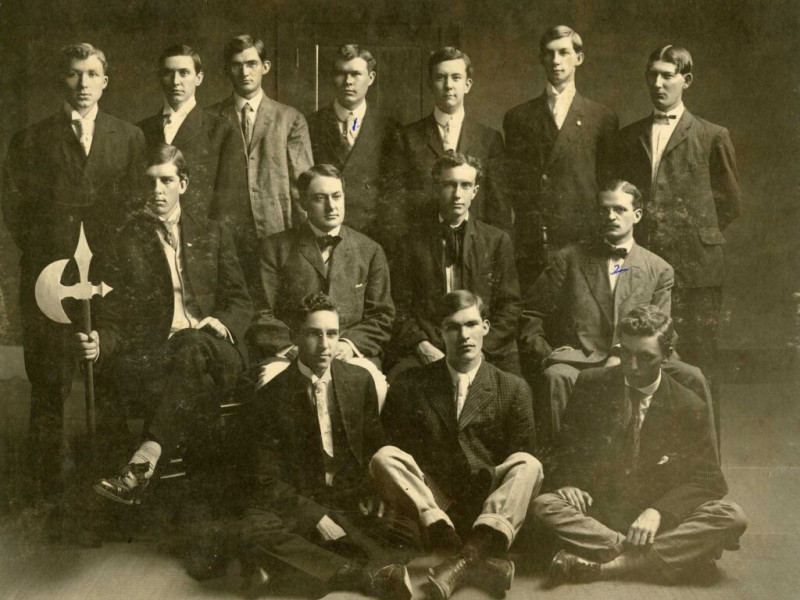





Written By Nik Koulogeorge

Written By
Published
Mar. 1, 2018
Updated
Nov. 21, 2021
I spent about six years working in fraternity expansion. My staff at Delta Sigma Phi led the field for much of that time. Of course, every fraternity claims that they are "leading" the field most of the time, but I have the data to prove it. Furthermore, few people may know how much has changed with fraternity expansion over the past 10 years. Fraternity expansion professionals would not speak much with one another when I first started at Delta Sigma Phi.
Thanks in large part to my colleague, Andy Bremer (now at Alpha Sigma Phi), and the staff at Phired Up, expansion professionals from different fraternities organized social outings at conferences, shared best practices, vouched for one another where possible, and trained together by the time I quit my fraternity job. There is now a "growth summit" specifically for fraternity (and sorority) expansion/extension teams. That is a lot of growth in a short time. Fraternity expansion became more competitive as a result of these initiatives.
Unfortunately, there are no set standards by which to grade fraternities, So expectations and processes differ from school to school. Many fraternities may compete for one or two opportunities to establish a chapter at a school. In my experience, those decisions (made by committees put together by the campus-based fraternity/sorority professional) are subjective. Part of my job was to study my competition, and so I studied what campus professionals and students wanted, what competing fraternities offered, and how we could highlight our organization's strengths.
I am not the most experienced fraternity growth professional, but I was a great one (and humble too!). Here are some things I learned along the way:
Names aren't enough. A board isn't enough. A promise that a chapter will at some point have a volunteer board is certainly not enough. Every chapter, new and old, needs long-term advisory support. Even if a staff member is present for a year (something I'll get back to later in this article) they are still hundreds or thousands of miles away thereafter.
It's important to know the people working with a chapter. and to know that they are committed to its success. That can be hard to gauge, but some indicators of success include financial investments or commitments from the alumni before the establishment of a chapter. Several fraternities now require that alumni assist in paying for the cost of staffing a fraternity recruitment campaign. That is certainly a better indicator of a volunteer's commitment to a chapter than a list of all alumni living within 60 miles of a school (a statistic commonly requested by expansion committees).
A fraternity's recruiting staff, to recruit the right type of men, need to be able to connect with a variety of men, think on their feet, work long hours, and be trusted to say "no" to men who may doom the fate of a chapter.
I made it a key component of every interview I conducted to require candidates to play several games one would play in an improv theater. I would ask that they share a controversial belief with me (just to gauge their ability to manage uncomfortable conversations). Some are considered exceptional recruiters because they could put up big numbers, but their selectivity was lacking. Many fraternities resort to recruiting extroverted, handsome, and well-dressed individuals for expansion. These people are often impressive in their first impression, but they need to be trusted to make thoughtful and consequential decisions.
Recruitment teams perform well when they can inspire a group of students and recruit those who will maintain the standards one expects of an excellent chapter. How can you be sure that a fraternity values high-quality recruiters? Ask and compare what fraternities are paying their recruiters. Ask how much time recruiters get off after an expansion campaign. Request referrals from students at other universities regarding the quality of the fraternity staff.
This is a message to every campus professional, fraternity board member, and fraternity executive - particularly if you've never worked as a recruiter yourself: Luck will always play a role in the success or failure of an expansion. The two previous points can mitigate a little bad luck, but a successful recruitment effort ultimately depends on several unknown variables:
Are university staff and students willing to refer other students to recruiters?
How many referred students will answer a request to meet a stranger? (the recruiter/s)
How many (and which) students are interested in starting a new fraternity?
How many of the students can afford the cost of membership & how many consider it to be worth the cost?
Fraternity recruiters need access to student leaders, campus facilities, and campus-based professionals to find and meet the best possible students to start a fraternity chapter. It is a lot of work, and new fraternity chapters are often saddled with the same (or more) expectations set for every other fraternity chapter. Luck is real, certainty is not. No fraternity succeeds every single time. Sometimes expansion campaigns fail due to incompetence. Sometimes it's bad luck.
One recent fad (thanks Beta) is to require that a fraternity station a staff member on campus for a semester or a full academic year. This tactic is pulled from the sorority playbook but often means that a staff member is "based" on campus and travels to other chapters from there.
A fraternity staff member should live on campus for one academic term (semester, trimester, or quarter) at most. After that, expect a few, 2-3 day visits. More important than the illusion of 24/7 support is that the expectations of a new or re-developed chapter gradually increase over several years. Many new chapters succumb to the complexity of fraternity standards and organizations. They do not need a full-time babysitter if their goals are reasonable, realistic, and progressive.
Start by teaching founding members how to determine a niche, how to recruit members, and how to hold members accountable. Then worry about the programmatic, non-essential things: service projects, philanthropy, dance competitions, etc. I'd sometimes visit a campus a few months after recruiting a class of founding fathers and hear complaints from Student Affairs staff that they haven't yet completely transformed the fraternity/sorority community. . . Um, duh? Most of them have never seen a gavel before.
People love gifts, and fraternity men and women love the illusion of philanthropy. Donating to the Association of Fraternity/Sorority Advisors (AFA), for example, is often conflated with caring about the fraternity experience. I would often offer a recruitment workshop for leaders of other fraternities as a way to appease the anti-competitive nature of Inter-Fraternity Council members. Some fraternities promise thousands of dollars in scholarships or a reduced rate of dues for founding members.
These promises sound nice and make for a great press release, but they are typically short-term commitments. A member who cannot afford the standard rate of dues will quit once their founding father discount disappears. Such gestures are nice, but they are not indicators of long-term success. They should have no role in your expansion committee's decision-making process.
I once presented at a school against 2 much larger fraternities. After the presentation, we were told that the students liked us best, but that the other fraternities were larger, and so they decided to choose them and not us. That is not a joke. The campus-based fraternity/sorority professional and IFC president told me over the phone that we should try again after the other two fraternities established their respective chapters. . . um, what? (Lucky for us, that school has suspended its entire fraternity community several times since that presentation. We dodged a bullet).
The size and name recognition of a fraternity does not matter to students who never before considered Greek Life. Look at a fraternity's success rate and look at whether they are investing their resources in staff and volunteers or frills and promises they can't reasonably keep.
The best way to encourage a successful fraternity expansion is to value the expansion process itself. The Olympic-style selection committees are having the same effects on fraternity expansion that they had on the Olympics: it's too political, it's too expensive, and it favors prestige over functionality.
Teamwork and compassion make fraternities great. Whether new or not. We are all Friend Clubs at the core.
Help keep it going and growing by contributing as little as $2. (Links below will take you to a secure payment portal via Stripe)
A free way to support: Subscribe to the Fraternity Man newsletter for [very occasional] updates and giveaways.